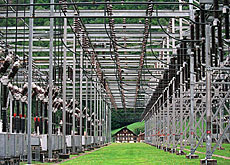Bilateral energy accord is in the pipeline

Switzerland and the European Union are working on a bilateral energy accord, focusing on sector regulation and network security.
Both sides say such a treaty should prevent a repeat of the blackout in Italy in 2003 which was caused by a broken power line in Switzerland.
Moritz Leuenberger, the Swiss energy minister, and Andris Piebalgs, the EU energy commissioner, met in Bern on Thursday and confirmed negotiations are set to begin next year.
The Federal Energy Office said the treaty should focus on the regulation of cross-border energy, mutual market access and renewable energy sources.
The EU has set clear targets for increasing the amount of “green” energy from renewable sources.
It said Switzerland and the EU had a common interest in energy regulation and therefore a central point of the negotiations would be guaranteeing electricity supply.
Network security
The technical and commercial conditions for network security will also be addressed.
Network security has been an issue between Switzerland and the EU ever since a blackout in Italy in September 2003 plunged 57 million Italians into darkness.
The blackout was triggered by a tree falling on a power line in central Switzerland – when the electricity was not properly diverted, the Italian network collapsed.
Switzerland and Italy promptly blamed each other, but the Federal Energy Office eventually said the whole European electricity market was responsible for the breakdown. It said there were conflicts of interest in addition to technical and legal issues.
The new bilateral accord should put an end to those stumbling blocks.
Legal basis
The Federal Energy Office said the basis for the negotiations would be the new energy laws currently being discussed by the Swiss parliament.
On September 21 the House of Representatives voted in favour of a two-stage approach to liberalisation of Switzerland’s electricity market.
The proposal foresees opening the market first to big electricity providers and later to private homes.
The government has argued that Switzerland, as a European power hub, cannot stand apart as the internal EU electricity market becomes more developed.
Under the draft law, all end-users would be able to choose their supplier freely by 2007. Such a change would bring Swiss legislation closer into line with that of the EU, which also wants to introduce consumer choice.
swissinfo with agencies
On September 21 the Swiss parliament voted for a two-stage approach to liberalisation of Switzerland’s electricity market.
The proposal foresees opening the market to big electricity providers in 2007 and to private homes in 2012.
Switzerland and the EU have agreed 16 bilateral accords.
Bilaterals I, concluded in 1999, cover seven specific areas: the free movement of persons, the elimination of technical barriers to trade, public procurement markets, civil aviation, overland transport, agriculture and research.
They came into force on 1 June 2002.
The second round of bilateral accords with the EU include Schengen/Dublin, taxation of savings, and the fight against fraud.

In compliance with the JTI standards
More: SWI swissinfo.ch certified by the Journalism Trust Initiative











You can find an overview of ongoing debates with our journalists here . Please join us!
If you want to start a conversation about a topic raised in this article or want to report factual errors, email us at english@swissinfo.ch.